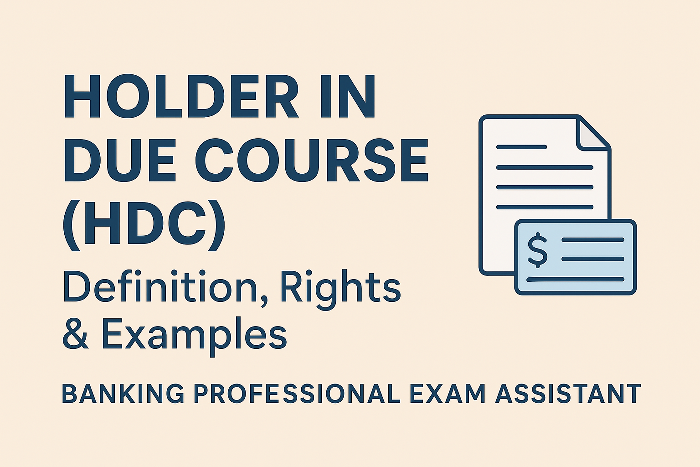In the world of banking, business, and finance, negotiable instruments such as cheques, bills of exchange, and promissory notes play a crucial role in ensuring smooth transactions. One important legal concept in this area is the “Holder in Due Course” (HDC). Understanding what this term means and the rights associated with it is essential for both professionals and students of law or commerce.
—
—
What is a Holder in Due Course?
A Holder in Due Course is a person who has obtained a negotiable instrument:
1. For consideration (they have given something of value in exchange for it),
2. Before its maturity (before it becomes payable), and
3. In good faith and without knowledge of any defect in the title of the person from whom they obtained it.
Simply put, an HDC is someone who receives a negotiable instrument honestly, pays for it, and has no idea of any problems or fraud related to it.
—
Legal Definition
Under the Negotiable Instruments Act, 1881 (India, Bangladesh, and Pakistan versions), Section 9 defines a Holder in Due Course as:
> “A person who, for consideration, became the possessor of a promissory note, bill of exchange, or cheque, if payable to bearer, or the payee or indorsee thereof, if payable to order, before it became overdue, without having sufficient cause to believe that any defect existed in the title of the person from whom he derived his title.”
—
Essential Conditions for Becoming an HDC
To be recognized as a Holder in Due Course, the following conditions must be met:
1. Must be a holder – The person must either possess the instrument (if bearer) or be the named payee/endorsee (if order).
2. For consideration – The instrument must be taken in exchange for something of value (money, goods, or services).
3. Before maturity – The instrument must be acquired before the date it becomes payable.
4. In good faith – The holder must believe that the title is clear and free from defects.
5. Without notice of defects – The holder must not be aware of any forgery, fraud, or prior ownership disputes.
—
Rights of a Holder in Due Course
Keywords: Holder in Due Course, Negotiable Instruments Act, Rights of HDC, Negotiable Instruments Law, Banking Law
The law gives an HDC special rights and protections:
Better title than the transferor – Even if the person who transferred the instrument had a defective title, the HDC gets a clean title.
Right to sue – An HDC can sue all prior parties liable on the instrument without any restrictions.
Protection against certain defenses – Personal defenses (like lack of consideration, fraud in inducement, etc.) cannot be used against an HDC.
Free from prior defects – The HDC is not affected by disputes between the original parties.
—
Importance of the Concept
The Holder in Due Course concept ensures trust and fluidity in the circulation of negotiable instruments. It protects honest holders and encourages businesses to accept and trade these instruments without fear of unknown past disputes.
—
Example
Imagine Mr. A issues a cheque to Mr. B for goods purchased. Unknown to Mr. B, the goods were defective. Mr. B sells the cheque to Mr. C (for value) before its due date, and Mr. C has no idea about the defect in goods. In this case, Mr. C becomes a Holder in Due Course and can claim the full amount of the cheque from Mr. A, regardless of the dispute between A and B.
—
Conclusion
The concept of Holder in Due Course is designed to promote fairness, trust, and the free transferability of negotiable instruments. For banking professionals, lawyers, and business owners, understanding this principle can help in both protecting rights and avoiding legal pitfalls.



